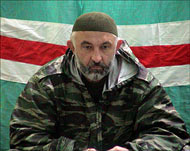Chechens in Jordan launch protest
Jordanians of Chechen origin have staged a sit in near the UN offices in Amman, demanding it pressure Russian authorities to hand over the remains of assassinated Chechen separatist leader Aslan Maskhadov.

The protesters held photos of the slain Chechen leader who was killed by Russian forces earlier this month, and chanted slogans calling for peace in Chechnya, Aljazeera learned.
A Chechen community was formed in Jordan after they fled Chechnya in the late 19th century amid ongoing Russian oppression. They have a representative in the Jordanian parliament.
The Jordan protest comes after Russia‘s top human rights activists called on Moscow to return Maskhadov’s body to his relatives for burial.
Maskhadov, a 53-year-old separatist chief, who at one time had been chosen as Chechnya‘s president in a widely recognised election, was killed on 8 March in a village north of the capital Grozny.
Reward
Russia‘s FSB security service said on Tuesday it had paid a $10-million reward for information that led to the location and killing of Maskhadov.
|
“These citizens were paid the monetary reward in full. If necessary, they will receive help in moving to another Russian region or a Muslim country” |
“After a monetary reward in the sum of $10 million was announced in September 2004 for information about the whereabouts of terrorist leaders, the FSB was approached by citizens who gave the necessary data,” a spokesman for the successor service to the Soviet-era KGB said.
“This aided in determining the exact location of international terrorist and Chechen band leader Maskhadov, as well as the carrying out of a special operation” which led to his death, he said.
“These citizens were paid the monetary reward in full. If necessary, they will receive help in moving to another Russian region or a Muslim country,” he said.
Home detonated
Meanwhile, the authorities in Chechnya blew up the home where Maskhadov was said to have been killed by Russian troops last week.
 |
|
Aslan Maskhadov opposed |
Officials said the house was destroyed since they feared deadly booby traps, but rights activists and government critics said the move added to the mystery behind Maskhadov’s suspicious killing.
General Arkady Yedelev, chief of the federal headquarters for the campaign in Chechnya, said demolition experts who inspected the bunker discovered and detonated a box that contained documents and was ridden with explosives.
Official version
“The team of investigators decided to blow up the entire house to avoid such surprises in the future,” Yedelev said.
Federal troops arrived on Sunday in several trucks and armoured vehicles, ordered residents of neighbouring buildings to clear the area and then blew up the house, witnesses said.
A neighbour, who identified herself only by her first name, Zura, said the explosion shattered windows and cracked walls in her house. “It scared me and my children to death,” she said.
While federal authorities said Maskhadov was hiding in the bunker, Yakha Yusupova – who lived in the house with her family – denied the rebel leader had been there and said she suspected Russian forces might have brought him on Tuesday.
Questions
Anna Politkovskaya, a prominent Russian columnist and expert on Chechnya, said the house was apparently blown up to destroy any evidence that could cast doubt on official accounts of Maskhadov’s killing.
|
“There is nothing left now to question the official version of events. Can’t they defuse booby traps without blowing up the entire house?” |
“There is nothing left now to question the official version of events,” Politkovskaya said in a telephone interview, scoffing at the official explanation.
“Can’t they defuse booby traps without blowing up the entire house? she said.
Alexander Petrov of Human Rights Watch’s Moscow office said federal authorities in the past had blown up houses in Chechnya that belonged to separatist fighters who participated in attacks.
The practice has drawn strong criticism from international rights groups, he said.
“If the authorities blew up the house to punish the house owners, it’s a bad move,” Petrov said.